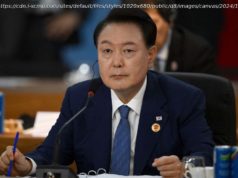Why the former California Supreme Court justice and D. C. circuit judge would be a natural choice in the Trump administration.
The Wall Street Journal has reported that President Trump is considering former D. C. circuit judge and former California Supreme Court justice Janice Rogers Brown to succeed Jeff Sessions as attorney general. Assuming that becomes necessary at some point, it is important that the president pick someone who will continue the important work Sessions has already undertaken during his tenure at the Department of Justice in matters such as criminal justice reform and illegal immigration.
It will also be important, in this time of great partisan crisis, that the president pick someone with deep principle and courage, someone like Ed Meese, who held the post during the Ronald Reagan years. Brown meets both of those qualifications and would be an inspired choice.
I have had the pleasure of knowing Brown for years and witnessing, up close, her distinguished career in California. From her more than ten years of service on the California Supreme Court and Court of Appeals, to her service as legal affairs secretary to Gov. Pete Wilson, to her outstanding leadership as a deputy attorney general in California, it’s clear that Brown is an incredible public servant.
I can say from personal experience that what former President Ronald Reagan said about Meese can easily be modified for her: If Rogers Brown is not a good person, then there are no good people. Indeed, the three qualities that defined Meese’s service to President Reagan—loyalty, deep principle, and courage—demonstrate why Brown would make an outstanding attorney general in the Trump administration.
Brown’s career has never been about her. Her distinguished career in government was never the result of spotlight-seeking, but rather focused on defending the country and Constitution she has loved her whole life.
She is the daughter of an Alabama sharecropper. She attended segregated schools as a black woman, put herself through college and law school in California, and became an intellectual leader on both California’s highest court and what many call the nation’s second highest court––the D. C. Circuit––because of her deep faith in America’s innate goodness, and a family commitment to hard work.
Indeed, rather than come to Washington to seek a promotion, as some do, or linger on in the hopes that fate will tap her on the shoulder for higher office, as others do, Brown retired from the D. C. Circuit Court in 2017. Her career demonstrates that Trump could count on her to be completely focused on serving his priorities and the nation well, not her own advancement. Both he and the nation deserve nothing less.
Time and again, Brown’s judicial service evidences someone who is unafraid of being a clarion voice—a person of strong conviction in the face of both popular and elite opinion. More than perhaps any jurist except Supreme Court Justice Clarence Thomas, Brown has demonstrated a commitment to the principles in the Declaration of Independence when interpreting the Constitution.
Her knowledge and thoughtfulness led her to issue precedential decisions vindicating the separation of powers against the administrative state, such as fining the National Labor Relations Board and branding it a bad-faith actor for spending thousands of taxpayer dollars prosecuting a small business all the way to an appeal the Board knew it would lose, and enforcing the people of California’s desire to end racial favoritism against the cries of activist groups and those government entities that persisted in using race-based preferences.
Moreover, her principles represent the full spectrum of conservative thought from which the important issues confronted by the attorney general’s office would benefit, such as criminal justice reform. For example, she has admonished both the reflexive “ orthodoxy ” of courts deferring to sweeping police searches, and courts making up new ways for the guilty to escape their waiver of rights when pleading guilty (while quoting Allen Iverson in the process).
Brown has not only demonstrated the kind of leadership that being attorney general requires but has also thought through many of the regulatory and criminal justice issues the attorney general confronts. In many ways, that would make it natural for her to execute the president’s goals.
As President Trump has learned the hard way, there are entrenched interests within the bureaucracy and among the chattering classes that are absolutely committed to resisting his reforms. Succeeding Sessions will require the courage—and the skill—to make the arguments and navigate against those within the bureaucracy intent on thwarting the elected government.
Brown’s service has shown her capacity for these qualities time and again, and on issues that are a key focus to this administration. For example, on immigration, Brown worked in support of Proposition 187, one of the earliest, voter-approved initiatives to eliminate government aid to illegal aliens.
In a D. C. Circuit decision involving Sheriff Joe Arpaio’s effort to challenge the Obama administration ’s deliberate non-enforcement of our immigration laws, Brown wrote separately to explain how the law got to such “a myopic and constrained” place that, as she said, “the elected Sheriff of the nation’s fourth largest county, located mere miles from our border with Mexico, cannot challenge the federal government’s” decision to defer removal of immigrants illegal present in the United States.
Indeed, Brown’s courage in standing up to bureaucratic corruption may have even been prescient regarding one of the reforms Sessions instituted: She laid out a sweeping constitutional case against the government using lawsuit settlements to send tens of millions of taxpayer dollars to “nonprofits” (usually activist groups) that are not parties to the lawsuit. Mere weeks after Brown wrote that dissenting opinion, Sessions modified the Justice Department’s practices to ensure it would never do that again, citing the same concerns Brown’s dissent explored at length.
In addition to her loyalty to the American principles to which the president appeals, her deep knowledge of our founding, and her fortitude in standing up for those principles, would help Brown mentor the next generation, in the same way Meese did. As Leonard Leo put it about Meese, “[t]hree of [the] founders of the Federalist Society were people who, in a lot of ways, studied at the feet of Ed Meese… Countless people who have gone on to engage in other forms of public service and a number of people on the federal bench first cut their teeth in the law under Ed Meese’s direction.






